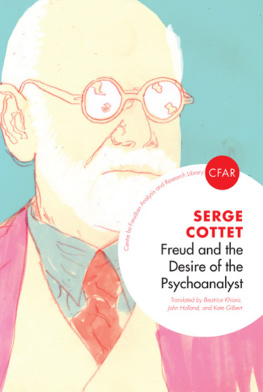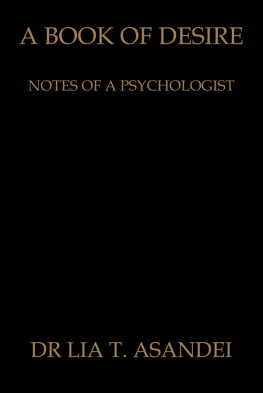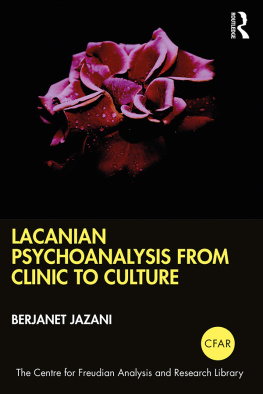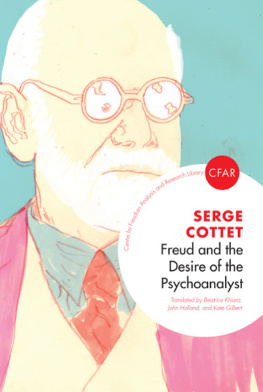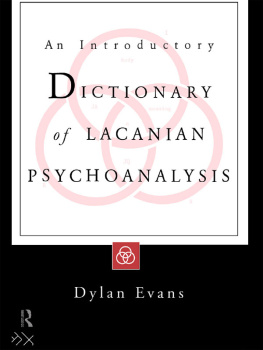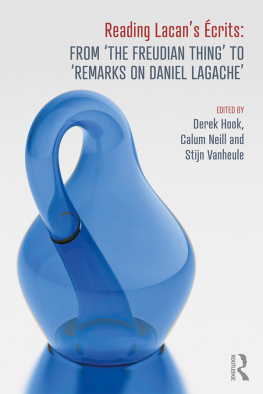First published in English in 2012 by
Karnac Books Ltd
118 Finchley Road
London NW3 5HT
Copyright Editions du Seuil, 1996
The first edition of this work was published by Editions Navarin in 1982 as Freud et le dsir de psychanalyste.

This book is supported by the French Ministry of Foreign Affairs, as part of the Burgess programme run by the Cultural Department of the French Embassy in London. www.frenchbooknews.com
CFAR Library Series Editors Anouchka Grose, Darian Leader, Alan Rowan
The Centre for Freudian Analysis and Research
CFAR was founded in 1985 with the aim of developing Freudian and Lacanian psychoanalysis in the UK. Lacans rereading and rethinking of Freud had been neglected in the Anglophone world, despite its important implications for the theory and practice of psychoanalysis. Today, this situation is changing, with a lively culture of training groups, seminars, conferences and publications.
CFAR offers both introductory and advanced courses in psychoanalysis, as well as a clinical training programme in Lacanian psychoanalysis. It can provide access to Lacanian psychoanalysts working in the UK, and has links with Lacanian groups across the world. The CFAR Library aims to make classic Lacanian texts available in English for the first time, as well as publishing original research in the Lacanian field.
www.cfar.org.uk
ISBN-13: 978-1-85575-592-5
Typeset by Vikatan Publishing Solutions (P) Ltd., Chennai, India
Printed in Great Britain
www.karnacbooks.com
Occasionally something stirs toward synthesis, but I am holding it down.
Freud, letter to Wilhelm Fliess, 16 April 1900.
The truth is perhaps simply one thing, namely, the desire of Freud himself, the fact that something, in Freud, was never analyzed.
Lacan, The Four Fundamental Concepts of Psycho-analysis.
Masson, The Complete Letters of Sigmund Freud to Wilhelm Fliess 18871904, p. 409.
Seminar XI, p. 12.
Table of Contents
INTRODUCTION
The modern interpretation of psychoanalysis has been oriented for some years towards a more or less sceptical relativism: Freuds work has been relativized with respect to the prejudices of his time, such as those towards women. It has also been relativized in terms of his dealings with his students; and today his work is being placed in a new perspective by Lacans teaching.
It is fashionable now to relativize Freud by blunting the sharp edge of his discovery; in my opinion, this approach derives its consistency from its failure to ask a question about psychoanalysis: the question of Freuds desire and of the origin of psychoanalysis. Through Lacan, we have learned how to apply to Freuds work the principles that originated in it and the rules of interpretation that it formulated. Thus, Freud is relative even in connection with himself. This is, indeed, a consequence of Freuds own discourse: it does not exempt its inventor from speaking from a place of which he is unaware. Since this place is that of his own desire, the problematic that I am bringing up has, naturally, been dictated to us by its own inventor. What is the desire of the analyst? I am going to direct this crucial question to Freuds own work. There is something in Freud that, according to Lacan, has not been analysed and which must be deciphered (dchiffr).
I propose here to inject into the body of Freuds texts an essential Lacanian categorythe desire of the analystin order to test a thesis of Lacans: [I]t is ultimately the analysts desire that operates in psychoanalysis (crits, p. 724).
This key should allow a reading of Freuds work that is guided by Lacanian principles.
Emphasizing what has never been analysed in Freudian psychoanalysis raises formidable methodological problems. I would like, therefore, to dissipate any equivocations concerning this project. The reader will not find, in the following work, that I have used psychoanalysis to make deductions about the unconscious of its inventor. Various authors have already made this attempt, and the result is a psychological reduction of Freuds discovery, which clearly shows that they have not understood his work. Freud, indeed, believed that psychoanalysis could eventually be included within the problematic of science. Consequently, only demonstrations that are more radical than his own can be allowed into this field.
Freuds biography, the avatars of his personal history, and even the elements of his self-analysis ought not to exempt authors from analysing his work with the same rigour that he transmitted to us. The goal of such attempts is always to return Freuds discovery to the embrace of psychology. My point of view is entirely opposed to such a project. Not only do I consider Freuds desire to be essential in order to explain and enter into his work, but I also believe that insofar as psychoanalysis becomes confused with the desire of its inventor, this discipline loses all consistency, seeking to conceptualize itself by objectifying the analytic experience.
For the same reason, I shall avoid reducing the desire of the analyst to his fantasy. This orientation leads, in general, to a conception of analysis as a two-body relation, a conception that is criticized in this work.
It is clear, furthermore, that the advocates of a psychological approach to Freud are the same people who rank as the most faithful guardians of the psychological sciences. I shall argue, on the contrary, that the psychoanalysts desire can be read less in his dreams than in his technical writings.
If I have the impertinence to ask this question, it may be because, on the one hand, Lacan had already asked it, but also because it becomes unavoidable from the moment that Freud is treated as someone other than one author among many: as the inventor of the concepts and operations that have propagated and diffused psychoanalysis. When psychoanalysis forgets the origin and the history of the concepts that it conveys or unveils, it misunderstands the nature of its object, by taking it to be objective.
To claim that the entire theoretical and technical operation that Freud produced is relative to his desire does not invalidate his work. It is, on the contrary, by accentuating this dependence that psychoanalysis can still avoid the growing bastardization of its concepts. It is always necessary to highlight, in Freuds orientation, the extreme virulence of his thought and the radical character of his topics, all of which are being stifled today by improper conceptualizations of psychoanalysis. The problematic of the desire of the analyst, however, does not derive its legitimacy from the Lacanian operation and from the cuts that Lacan effected in Freuds texts. Although Freud does not thematize the desire of the psychoanalyst, this category can be taken to be equivalent to a number of problems that he did mention. The goal of my work is to bring the following problems together and to avoid treating them as scattered and unrelated, as readers of Freud usually do: suggestion, the ideals of the analyst, the idea of the end of analysis, and Freuds ethic. All these questions are internal to psychoanalysis, and their vectors originate from one point: the desire of the analyst. This decrypting of Freud by means of Freud himself makes him a symptom in psychoanalysis.
Yet is it legitimate to treat a written text as material to be interpreted? Can psychoanalytic texts be treated as if they were an immense slip of the tongue? Psychoanalysis teaches us that only the enunciation authorizes interpretation; statements (

